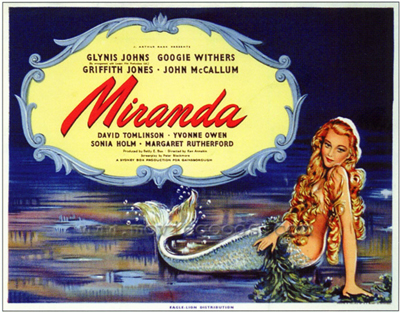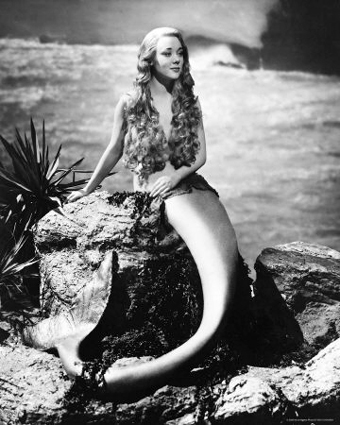
 |
|
|
|
1948 was the unofficial year of the mermaid, cinematically speaking. In RKO's better-known Mr. Peabody and the Mermaid, a married man turning fifty years old (William Powell) brings an amorous mermaid (Ann Blyth) back to the fountain of his vacation bungalow. Is she real, or only a hallucination of his mid-life crisis? 
Released a few months later but based on a pre-existing play, Gainsborough Films' Miranda is an engaging chamber comedy packed with sly humor, flirtatious talk and a sexual abandon unavailable to American films of the time. The movie helped cement Glynis Johns' star rating; in many scenes she's paired with a young David Tomlinson, sixteen years before they became Mr. and Mrs. Banks in Disney's Mary Poppins. On a fishing vacation in Cornwall, doctor Paul Marton (Griffith Jones) is captured by the seductive Miranda Trewella (Glynis Johns), a mermaid who speaks beautiful English, sings like a dream and loves men from the world of the land. Clearly not in his right mind, Paul takes Miranda to his London house as a special patient, hiding her tail and pretending that she cannot walk. Paul's unusually understanding wife Clare (Googie Withers of Night and the City) takes this in stride, even as Miranda captures the heart of their chauffeur Charles (David Tomlinson) and the attentions of artist Nigel (John McCallum), the fiancé of her best friend. Nurse Carey (Margaret Rutherford) loves magical beings and is delighted to keep Miranda's secret: the mermaid doesn't want to end up a pickled exhibit in the British Museum. Miranda loves being taken around London and visiting the Opera, and is soon sneaking off to Nigel's to sit for a portrait. Clare realizes that two romances and her own marriage are in jeopardy... and wonders why goldfish are disappearing from her goldfish bowl. Sometimes the perfect entertainment is a provocative fantasy with no 'big lesson' to impart. Ms. Johns' Miranda is a hoot, a sheer delight. Outwardly innocent, the mermaid is actually very direct in her dealings with men. When Paul or David carries her, she looks into their eyes and compliments them with such a dreamy voice that we can't tell if she's just sexy or is applying some form of mermaid spell-casting. Unlike the exotic 'pretty young thing' represented by Ann Blyth's fantastic mermaid, Miranda is perfectly capable of expressing her desires. 
The movie is unusual in that the females dominate the proceedings almost entirely. Good fellows all, Paul, David and Nigel turn to taffy when Miranda bats her eyes and flatters them. We don't find out what she really wants until the end, when we're reminded that some seagoing fish swim up into fresh rivers to (forgive the crudity) spawn. But the wife Clare Marton shows that she comes from a long line of sturdy English womenfolk herself. Clare hides her shock and surprise at Miranda's undisguised come-ons and other seductive behavior, and resists throwing a fit even when she discovers that her husband has purchased his patient's wardrobe. Despite abundant evidence that Paul is flaunting an affair right under her nose, Clare is too smart to let her marriage blow up. The full revelation of Miranda's identity and the resolution of her four weeks in London are too clever to detail here. Director Ken Annakin glides through the smart and ironic dialogue scenes and manages some impressive set pieces. Asking to be taken to the zoo, the wheelchair-bound mermaid carries on a lively (and loud) argument with a sea lion, after stealing one of its fish. She's also the best customer a cockle-salesman ever had. On a quirky final date at the opera, Miranda takes advantage of an opportunity to sing at Covent Garden, to the horror and ire of the opera company. And on the way home, she talks Paul into stopping to take a quick dip in a local pond. The fanciful mermaid with the musical voice can talk any man into just about anything. 
Miranda looks good in her swimming scenes, although we never get a really close-up look at her tail. Effects fans comparing her to Universal's mermaid will note that Ann Blyth's 'tail sheath' is quite beautifully sculpted (clearly by the same folks who designed The Creature from the Black Lagoon). In an early scene a wire used to animate the tail is painfully obvious, as well. Yet Miranda is just as effective a fantasy creation, and the hints she gives of life under the sea are very interesting. Mer-men exist, but she doesn't like their flat noses and beady eyes. Miranda doesn't get along well with one of her many sisters, but it works out because the sister is in the South Pacific. Most pointedly, Miranda says that mermaids and humans sometimes have offspring, which puts the movie on an altogether saucier plane. This ain't your Disney The Little Mermaid: Miranda has sex with Paul and probably Nigel and David as well. This becomes even more of a "big question" when the fade-out sees what Miranda is doing down in sunny Majorca. We have to respect a movie as liberated as this one -- Clare Marton can guess what her hubby is up to and doesn't let it interfere with their marriage. Miranda surprises us with a solid laugh every couple of minutes, and has enough charm and warmth for three movies. A Technicolor sequel (Mad about Men) came out in 1954, with Glynis Johns again playing Miranda Trewella. It also looks as if Ms. Johns reappeared as Miranda in a cameo in the 1949 comedy Helter Skelter. VCI Entertainment's DVD of Miranda is a good B&W transfer that shows some patchy blockage in its blacks. The audio is very clear, which is good because no subtitles are available. It's too bad that no extras are offered; the charming Glynis Johns & Googie Withers and the 'liberated' screenplay make us curious to know more about this clever, playful picture.
On a scale of Excellent, Good, Fair, and Poor,
Miranda rates:
Reviews on the Savant main site have additional credits information and are often updated and annotated with reader input and graphics. Also, don't forget the 2010 Savant Wish List. T'was Ever Thus.
Review Staff | About DVD Talk | Newsletter Subscribe | Join DVD Talk Forum |
| ||||||||||||||||||